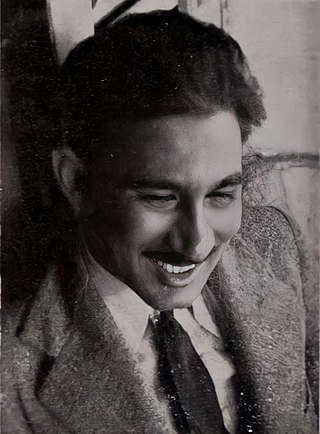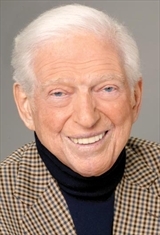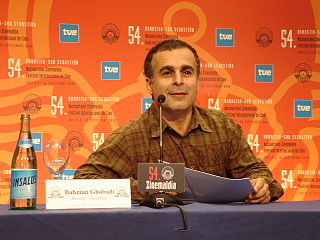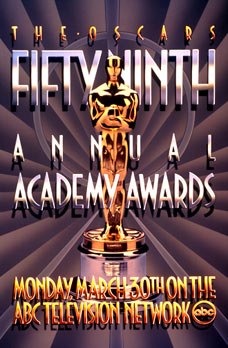Related Research Articles

Khwaja Ahmad Abbas was an Indian film director, screenwriter, novelist, and journalist in Urdu, Hindi and English.
The Academy Award for Best Documentary Feature Film is an award for documentary films. In 1941, the first awards for feature-length documentaries were bestowed as Special Awards to Kukan and Target for Tonight. They have since been bestowed competitively each year, with the exception of 1946. Copies of every winning film are held by the Academy Film Archive.

The Living Desert is a 1953 American nature documentary film that shows the everyday lives of the animals of the desert of the Southwestern United States. The film was written by James Algar, Winston Hibler, Jack Moffitt (uncredited) and Ted Sears. It was directed by Algar, with Hibler as the narrator and was filmed in Tucson, Arizona. The film won the 1953 Oscar for Best Documentary.
This is a list of films by year that have received an Academy Award together with the other nominations for best documentary short film. Following the Academy's practice, the year listed for each film is the year of release: the awards are announced and presented early in the following year. Copies of every winning film are held by the Academy Film Archive. Fifteen films are shortlisted before nominations are announced.

Sidney Sheldon was an American writer. He was prominent in the 1930s, first working on Broadway plays, and then in motion pictures, notably writing the successful comedy The Bachelor and the Bobby-Soxer (1947), which earned him an Oscar in 1948. He went on to work in television, where over twenty years he created The Patty Duke Show (1963–66), I Dream of Jeannie (1965–70), and Hart to Hart (1979–84). After turning 50, he began writing best-selling romantic suspense novels, such as Master of the Game (1982), The Other Side of Midnight (1973), and Rage of Angels (1980).

The March of Time is an American newsreel series sponsored by Time Inc. and shown in movie theaters from 1935 to 1951. It was based on a radio news series broadcast from 1931 to 1945 that was produced by advertising agency Batten, Barton, Durstine & Osborn (BBDO). The "voice" of both series was Westbrook Van Voorhis. Produced and written by Louis de Rochemont and his brother Richard de Rochemont, The March of Time was recognized with an Academy Honorary Award in 1937.
Charles Eli Guggenheim was an American documentary film director, producer, and screenwriter. He was the most honored documentary filmmaker in the academy history, winning four Oscars from twelve nominations.

Bahman Ghobadi is an Iranian Kurdish film director, producer and writer. He belongs to the "new wave" of Iranian cinema.

The 59th Academy Awards ceremony, organized by the Academy of Motion Picture Arts and Sciences (AMPAS), took place on March 30, 1987, at the Dorothy Chandler Pavilion in Los Angeles beginning at 6:00 p.m. PST / 9:00 p.m. EST. During the ceremony, AMPAS presented Academy Awards in 23 categories honoring films released in 1986. The ceremony, televised in the United States by ABC, was produced by Samuel Goldwyn Jr. and directed by Marty Pasetta. Actors Chevy Chase, Paul Hogan, and Goldie Hawn co-hosted the show. Hawn hosted the gala for the second time, having previously been a co-host of the 48th ceremony held in 1976. Meanwhile, this was Chase and Hogan's first Oscar-hosting stint. Eight days earlier, in a ceremony held at The Beverly Hilton in Beverly Hills, California, on March 22, the Academy Awards for Technical Achievement were presented by host Catherine Hicks.

Alexandr Hackenschmied, born Alexander Siegfried George Hackenschmied, known later as Alexander Hammid, was a Czech-American photographer, film director, cinematographer and film editor. He immigrated to the U.S. in 1938 and became involved in American avant-garde cinema. He is best known for three films: Crisis (1939), Meshes of the Afternoon (1943) and To Be Alive! (1964). He made Meshes of the Afternoon with Maya Deren, to whom he was married from 1942 to 1947. His second marriage was to the photographer Hella Heyman, who had also collaborated with Hammid and Deren on several films.
The 15th Academy Awards was held in the Cocoanut Grove at The Ambassador Hotel in Los Angeles on March 4, 1943, honoring the films of 1942. The ceremony is most famous for the speech by Greer Garson; accepting the award for Best Actress, Garson spoke for nearly six minutes, considered to be the longest Oscars acceptance speech. A portion of the ceremony was broadcast by CBS Radio.

December 7th is a 1943 propaganda documentary film produced by the US Navy and directed by Gregg Toland and John Ford, about the December 7, 1941 attack on Pearl Harbor, the event which sparked the Pacific War and American involvement in World War II. Toland was also the film's cinematographer and co-writer. The original version of this film, with a running time of 82 minutes, was not released but was retained by the National Archives. An edited version of 32 minutes length, which removed a long introductory segment and a shorter epilogue, was given limited release to specific audiences but won the Academy Award for Best Documentary in 1944. This is the only film Toland ever worked on for which he received a director credit.
Maureen Judge is a Canadian Screen Awards (CSA) winning filmmaker and television producer. Much of her work is documentary and explores themes of love, betrayal and acceptance in the context of the modern family, with the most recent films focusing on the dreams and challenges of contemporary youth.
Wings over Everest is a 1934 British short documentary film directed by Geoffrey Barkas and Ivor Montagu. It won an Academy Award in 1936 for Best Short Subject (Novelty). It described the 1933 Houston-Mount Everest flight expedition, in which Douglas Douglas-Hamilton, 14th Duke of Hamilton, otherwise known as Lord Clydesdale, piloted a single-engined biplane on 3 April 1933, just clearing Everest's southern peak by a few feet, having been caught in a powerful downdraught. The film used mixture of real footage of Everest from the record-breaking flight and theatrically produced scenes using the actual people rather than actors.

So Much for So Little is a 1949 American animated short documentary film directed by Chuck Jones and Friz Freleng. In 1950, it won an Oscar at the 22nd Academy Awards for Documentary Short Subject, tying with A Chance to Live. It was created by Warner Bros. Cartoons for the United States Public Health Service. As a work of the United States Government, the film is in the public domain. The Academy Film Archive preserved So Much for So Little in 2005. Produced during the Harry S. Truman administration, it attained renewed relevance during the modern Medicare for All movement in the United States nearly seven decades later.
A Year Toward Tomorrow is a 1966 American short documentary film about the Volunteers in Service to America, directed by Edmond Levy. In 1967, it won an Oscar for Documentary Short Subject at the 39th Academy Awards.
The Flight of the Gossamer Condor is a 1978 American short documentary film directed by Ben Shedd, about the development of the Gossamer Condor, the first human-powered aircraft, by a team led by Paul MacCready. The Academy Film Archive preserved The Flight of the Gossamer Condor in 2007.
The Witness: From the Balcony of Room 306 is a 2008 documentary short film created to honor the 40th annual remembrance of the life and death of Martin Luther King Jr. Directed by Adam Pertofsky, the film received a 2008 Oscar nomination in the "Best Documentary Short Subject" Category at the 81st Academy Awards.
Finalists for Best Documentary are selected by the Documentary Branch based on a preliminary ballot. A second preferential ballot determines the five nominees. These are the additional films that were shortlisted.
References
- 1 2 "Tomorrow We Fly". The Exhibitor. Vol. 30, no. 2. May 19, 1943. p. 1271 – via Internet Archive.
- ↑ "NY Times: Tomorrow We Fly". Movies & TV Dept. The New York Times . Archived from the original on October 15, 2012. Retrieved November 23, 2008.
- ↑ "The 16th Academy Awards (1944) Nominees and Winners". oscars.org. October 5, 2014. Retrieved May 29, 2019.